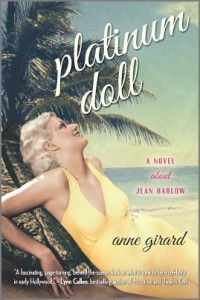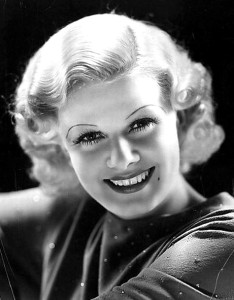 When the Camera Adores You — Jean Harlow’s Legacy (1928 – 1933, Hollywood): If you’re into New Year’s resolutions, here’s mine: keep searching for enchanting historical novels that let us escape the coarseness of today’s discourse. That’s why the spirited voices of creative souls reside in this blog, some taking us back to the glamorous days of Old Hollywood (see American Blonde, A Touch of Stardust, Laura Lamont’s Life in Pictures).
When the Camera Adores You — Jean Harlow’s Legacy (1928 – 1933, Hollywood): If you’re into New Year’s resolutions, here’s mine: keep searching for enchanting historical novels that let us escape the coarseness of today’s discourse. That’s why the spirited voices of creative souls reside in this blog, some taking us back to the glamorous days of Old Hollywood (see American Blonde, A Touch of Stardust, Laura Lamont’s Life in Pictures).
What distinguishes Platinum Doll from these others is Anne Girard brings us back to an even earlier Hollywood era: when silent films were transitioning to the “talkies.” Also, she pays tribute to just a slice of a movie star’s life – Jean Harlow’s – when she was coming-of-age, impressionable, unsure of her ambitions, then struggling to get noticed and once she did had to “fight to be taken seriously.” For Harlow was a strikingly beautiful, sexy ingénue with ash-blonde hair who was also a comedic talent. While her “goddess” legend lives on, most of us probably don’t know the influence she had on starlets who came after her.
Lovely Jean Harlow was born Harlean Carpenter. Her overly protective, achingly controlling mother bore the real name Jean Harlow. She too was a blonde beauty and dreamed of stardom, but she failed to make it in Hollywood, starting too late at the ripe old age of 30! Instead, “Mommie” lives out her fairy-tale vicariously through “Baby,” micro-managing her career and personal life. Mother-daughter bond was complicated, depicted sensitively. You’ll find yourself wishing Harlean was more assertive, but you’ll also understand the tenderheartedness of Harlean’s affections.
Devoted, vulnerable, and actually shy in public speaking, Harlean was a lover of books (she penned a novel) and animals. We first meet her at 17, six months after she eloped with Chuck McGrew, age 20, when they’ve left Kansas City for Beverly Hills. Her self-serving mother and gangster-like, swindling stepfather Marino Bello soon followed, upsetting the young marriage. A charming, compassionate Aunt Jetty and best friend, aspiring actress Rosalie Roy temper their scheming and self-indulgence.

Jean Harlow
via Wikimedia Commons
The young couple are living on Chuck’s $250,000 trust fund inherited from his parents who died in an accident, a tragedy that exerts a powerful role on their steamy, rocky marriage. Chuck brought his wife to Los Angeles because he adored her, knew she’d once been happy there, but he was too possessive, grief-stricken, and idle to accept that his gorgeous wife might want more out of life than being a housewife or mother. Doomed from the start because of Harlean’s domineering mother, Chuck’s jealous, drunken rages fueled her artistic desires and independence. It is for this reason that better known husbands and famous relationships with Clark Gable and William Powell do not play center-stage. It’s the significance of Chuck the author wants to tell us about.
The novel is a fascinating trip down memory lane. Its pages are filled with the names of stars like Clara Bow, Pola Negri, Gary Cooper, Laurel and Hardy, James Cagney, Jeannette MacDonald, Maurice Chevalier, Carole Lombard, Joan Crawford, Greta Garbo, and even Rin Tin Tin, as well as the moguls from that bygone motion picture age.
And you can’t help but feel nostalgic for a time when people actually used the words “swell” and “keen,” dignified dialogue that fits the elegant white gloves, silk gowns, and furs that wrapped Harlean’s “sleek, willowy body.” We can imagine her “sheathed in a new ivory-colored, knee-length crepe de chine dress with a band of lace at her hips.”
Sure this was the time of prohibitions – alcohol, most notably, and extremely binding contracts with big studios who virtually made the stars in those days (Howard Hughes notoriously underpaid and restricted Harlean). But these were also dazzling times, and Jean Harlow learned how to “Dazzle ‘em!” (Hughe’s marching orders for the heavily promoted war picture that propelled her stardom, Hells Angel’s, the first of many films she co-starred with Clark Gable).
My favorite historical novels come with an Author’s Note, cluing the reader in on how true to history the fiction stayed, and what inspired their work. Girard offers that, and more. No spoilers here in case, like me, you suspect but aren’t sure about the trajectory of the actress’ later years.
Girard’s respect for the film star and the film arts results in feel-good prose. For more of her deft fictionalizing of artists, read her terrific historical debut, Madame Picasso.
Here’s to more enchanted reading in 2016! Lorraine
This sounds wonderful! I really enjoyed Laura Lamont’s Life in Pictures, which was grounded in fiction with echoes of the Golden Age. This novel seems to stay very true to Jean Harlow’s life.
There have been a number of these fictionalized accounts of real people. Hemingway’s Girl and I Always Loved You come to mind. This seems to be a new trend in fiction.
Hi Jackie,
I love these bio-fiction historical novels. I think THE PARIS WIFE (Hemingway too) is thought to have started the sub-genre. I highly recommend another Irish writer, who wrote about Emily Dickinson: http://enchantedprose.com/miss-emily/ So did William Nicholson in Amherst. Interesting to compare the two. Thanks for checking in.